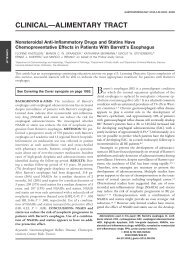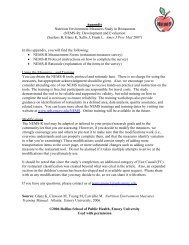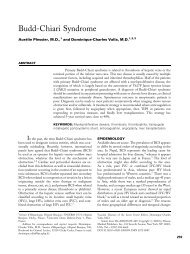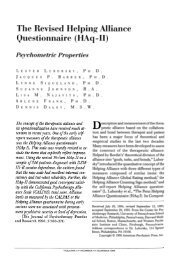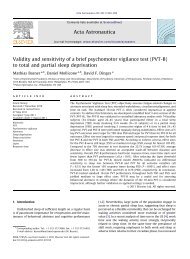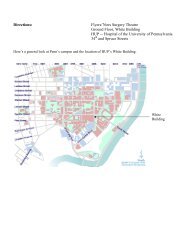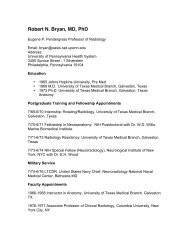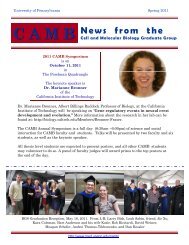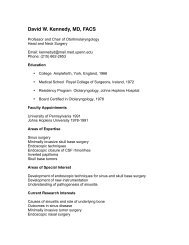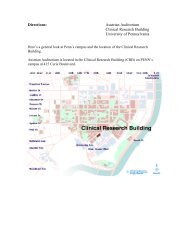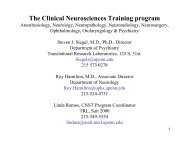PPP_Summer 2010_EDITED FINAL 072010:PPP.qxd - University of ...
PPP_Summer 2010_EDITED FINAL 072010:PPP.qxd - University of ...
PPP_Summer 2010_EDITED FINAL 072010:PPP.qxd - University of ...
You also want an ePaper? Increase the reach of your titles
YUMPU automatically turns print PDFs into web optimized ePapers that Google loves.
PAGE 32<br />
Continued from page 31<br />
co-leadership <strong>of</strong> the Center from<br />
both a clinical and basic science<br />
department highlights its translational<br />
focus and underscores the<br />
importance <strong>of</strong> combining preclinical<br />
and clinical research approaches to<br />
better understand nicotine dependence<br />
and its treatment,” Dr. Lerman<br />
emphasizes.<br />
Dr. Lerman and her team attack<br />
nicotine addiction from multiple<br />
directions. Using a pharmacogenetic<br />
approach, this work is validating<br />
genetically-targeted therapies for<br />
nicotine addiction, seeking “personalized”<br />
smoking cessation treatments.<br />
In addition, Dr. Lerman has<br />
made several key contributions<br />
through work on the clinical neuroscience<br />
<strong>of</strong> nicotine addiction,<br />
achieved in close collaboration with<br />
colleagues at Penn, specifically<br />
James Loughead, PhD, Ruben Gur,<br />
PhD, and Ze Wang, PhD in the<br />
Department <strong>of</strong> Psychiatry and John<br />
Detre, MD in the Department <strong>of</strong><br />
Neurology. This team has characterized<br />
the genetic and neural substrates<br />
<strong>of</strong> abstinence-induced<br />
cravings to smoke1 and <strong>of</strong> abstinence-induced<br />
cognitive deficits<br />
that promote smoking relapse. 2,3 In<br />
addition, with Robert Schnoll, PhD<br />
and Paul Wileyto, PhD in the<br />
Department <strong>of</strong> Psychiatry, David<br />
Asch MD in Medicine, and Dan<br />
Heitjan PhD in Epidemiology and<br />
Biostatistics, she has established the<br />
value <strong>of</strong> extended duration therapy<br />
for nicotine dependence treatment,<br />
and the pharmacogenetics <strong>of</strong> the<br />
efficacy <strong>of</strong> treatment duration. 4 This<br />
work challenges current practices<br />
for the acute treatment <strong>of</strong> nicotine<br />
dependence in suggesting that<br />
extended, or even maintenance<br />
therapy, may be needed to help<br />
smokers stay abstinent.<br />
Dr. Lerman’s close connection with<br />
the Annenberg School nourishes<br />
another <strong>of</strong> her primary research<br />
interests. As part <strong>of</strong> the Center <strong>of</strong><br />
Excellence in Cancer Communication<br />
Research, led by Robert Hornik<br />
PhD, she collaborates with Andrew<br />
Strasser, PhD in the Department <strong>of</strong><br />
Psychiatry and Joseph Cappella,<br />
PhD in the Annenberg School to<br />
evaluate anti-tobacco advertisements<br />
to improve message content<br />
and format. The goal is to design<br />
more effective media campaigns to<br />
motivate smokers to quit.<br />
Dr. Lerman and her<br />
team attack nicotine<br />
addiction from multiple<br />
directions. Using a<br />
pharmacogenetic<br />
approach, this work is<br />
validating geneticallytargeted<br />
therapies for<br />
nicotine addiction,<br />
seeking “personalized”<br />
smoking cessation<br />
treatments.<br />
One <strong>of</strong> Dr. Lerman’s important contributions<br />
has been to validate a<br />
specific genetically-informed biomarker<br />
as a useful diagnostic tool<br />
to help physicians custom-tailor<br />
drug therapies for nicotine dependence.<br />
5 Research had previously<br />
shown that the polymorphic<br />
enzyme CYP2A6 metabolizes<br />
between 70 to 80 percent <strong>of</strong> nicotine<br />
in humans and that it also activates<br />
some <strong>of</strong> the carcinogens in tobacco<br />
smoke. Inhibiting this enzyme<br />
reduces craving for nicotine. The<br />
critical findings by Dr. Lerman and<br />
her team that the nicotine metabolite<br />
ratio (NMR: 3’hydroxycotinine/cotinine)<br />
influences an<br />
individual’s success with different<br />
smoking cessation medications may<br />
lead to customized therapies to surmount<br />
genetic barriers in smokers<br />
who wish to stop.<br />
This potential genetic connection<br />
PENN PSYCHIATRY PERSPECTIVE � SUMMER <strong>2010</strong><br />
was learned in studies conducted<br />
since 2005 with both Penn scientists,<br />
Drs. Schnoll and Wileyto, and<br />
non-Penn researchers Rachel Tyndale,<br />
PhD at the <strong>University</strong> <strong>of</strong><br />
Toronto and Neal Benowitz, MD at<br />
the <strong>University</strong> <strong>of</strong> California at San<br />
Francisco. It is <strong>of</strong> such potential<br />
importance that the NIH is funding<br />
Dr. Lerman and this team to conduct<br />
a large multi-site translational<br />
clinical trial involving 1350 smokers<br />
to further test its validity by comparing<br />
alternative therapies for<br />
smoking cessation. Funding, as part<br />
<strong>of</strong> the NIH Pharmacogenetics<br />
Research Network, is provided by<br />
the NIDA, NCI, and National Institute<br />
<strong>of</strong> General Medical Sciences.<br />
This national clinical study, set to<br />
begin July 1, <strong>2010</strong>, is called the<br />
Pharmacogenetics <strong>of</strong> Nicotine<br />
Addiction Treatment (PNAT)<br />
research program and will be led<br />
by Dr. Lerman and Dr. Tyndale.<br />
Penn will be the prime institution<br />
for this program, which includes<br />
collaborations with seven major<br />
medical centers in the U.S. and<br />
Canada. Additional Penn faculty<br />
participating in the trial include Dr.<br />
Schnoll in the Department <strong>of</strong> Psychiatry;<br />
Dan Heitjan, PhD, Richard<br />
Landis, PhD, and Robert Curley,<br />
MS in the Department <strong>of</strong> Biostatistics<br />
and Epidemiology; Frank<br />
Leone, MD in the Department <strong>of</strong><br />
Medicine (Pulmonary Medicine);<br />
and Daniel Polsky, PhD and Henry<br />
Glick, PhD in the Department <strong>of</strong><br />
Medicine and the Leonard Davis<br />
Institute for Health Economics. In<br />
addition to studying the role <strong>of</strong><br />
variation in genes involved in nicotine<br />
pharmacokinetics, Dr. Lerman<br />
and her colleagues will study the<br />
contributions <strong>of</strong> genetic variation in<br />
neuronal nicotinic receptors and<br />
genes in other neurochemical pathways<br />
important in nicotine’s<br />
rewarding effects.<br />
Dr. Lerman’s research contributions<br />
have gained her substantial and<br />
international recognition and visi-<br />
Continued on page 33<br />
www.med.upenn.edu/psych




